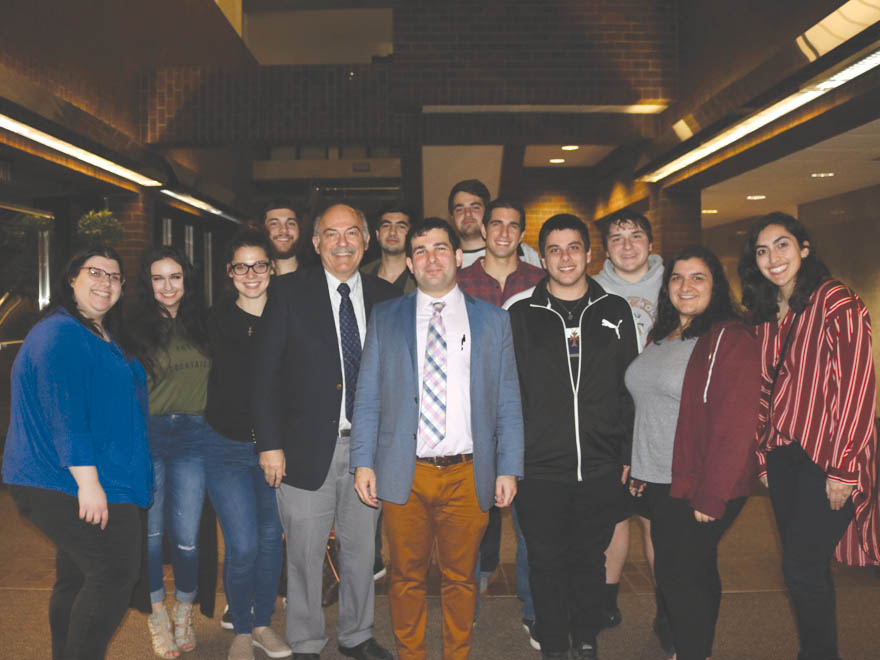David Safrazian
Staff Writer

The Armenians in Turkey today constitute only a small minority compared to the pre-Genocide Armenian population. As such they live interspersed within the larger Turkish community, especially in Istanbul. Thus they also share space in the religious arena, leading to interesting interactions with their neighbors.
The St. Gregory the Illuminator Armenian Church, located in Kuzguncuk, Turkey, shares a wall with a mosque next door where sometimes prayers are heard simultaneously. “Divine Liturgy is incredibly important to the life of Istanbul Armenians,” said guest speaker Dr. Christopher Sheklian.
On Friday, February 22, Dr. Sheklian presented a talk on “Liturgy and Property in Istanbul: The Armenian Minority in Turkey Today.” The focus of his presentation was the intertwining of liturgy and property in Istanbul and how the Armenian community negotiates its existence in the face of challenging obstacles.
Dr. Sheklian is currently the director of the Zohrab Information Center of the Eastern Diocese of the Armenian Church. He is also a native of Visalia and attended St. Mary Armenian Church of Yettem. Dr. Sheklian earned his M.A. and Ph.D. in Anthropology from the University of Chicago in 2017. He specializes in the Anthropology of religion and secularism, studying the role of liturgy and law on the lives of religious minorities.
Dr. Sheklian lived in Turkey for two years as he became immersed within the Armenian community and conducted fieldwork for his doctoral dissertation. During the Divine Liturgy of the St. Gregory the Illuminator Armenian Church, prayers are heard from the mosque next door. In the twentieth century, a mosque was built next to the Church and now prayers from the mosque can be heard in the Church. Dr. Sheklian played a recording that illustrated this point, expressing the idea that the harmonization of both the prayers of the mosque and Armenian Church hymns are similar to one another.
“The two melodies are not discordant, they align. One might even say that they are harmonious,” stated Dr. Sheklian.
Armenians have lived in Istanbul, and throughout Turkey, for centuries but began to move to Istanbul especially in the 18th and 19th centuries. They emigrated there for commercial reasons and for work opportunities. As the Armenian population grew, so also did the number of churches, and today there are still 36 active churches.
Dr. Sheklian gave a brief history on the significance of the Armenians in the Ottoman Empire and then discussed the importance of the vakif in the life of the community. A vakif is a form of endowment where a privately-owned property is endowed for a charitable purpose and the revenue generated is spent for that purpose.
Each individual Armenian church was thus endowed, but during the Armenian Genocide, and also later the Turkish government appropriated many of those lands. Recent changes in Turkish law have allowed Armenians to try to reclaim the lost property, but the complexity of the requirements to prove ownership have proven to be daunting.
When asked what was the most difficult part of his research, Dr. Sheklian responded that, “Building trust was the hardest part of this project because I was a stranger in a new community. Being Armenian helped in some ways, and also being involved in the church, being a deacon and participating in liturgy at various churches in Istanbul helped build the connection. I was able to meet many people and prove that I was there for a purpose.”
Dr. Sheklian is conducting research for two future projects. The first is research on the Armenian refugees from the Syrian civil war. He is studying their impact on existing Armenian Diaspora populations and how they integrate into society. His second project is on Environmental Theology, a field which is rapidly expanding, and which is based on an understanding of God’s relationship with the environment. According to Dr. Sheklian these ideas have not yet entered into Armenian theology but they should.
Dr. Sheklian’s presentation provided a new perspective on the Armenian community in Turkey.
 Hye Sharzhoom Armenian Action
Hye Sharzhoom Armenian Action